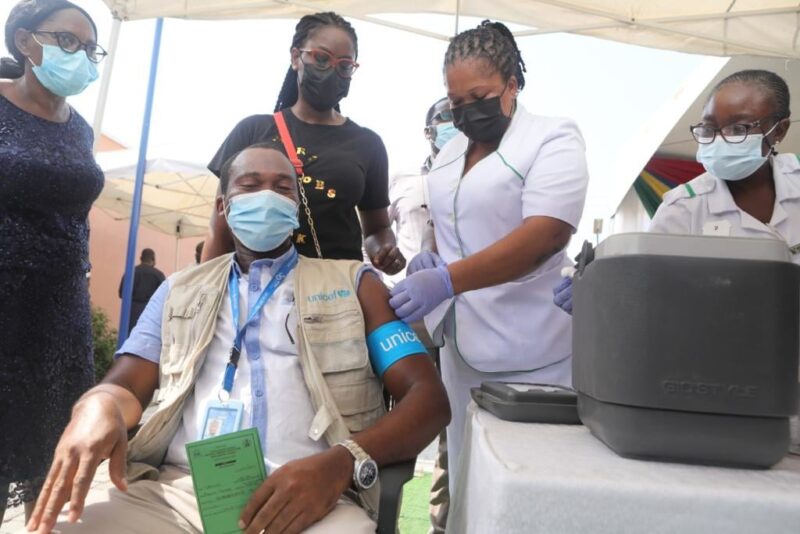COVID-19
Whole of Shanghai enters COVID lockdown despite lower symptomatic cases

Chinese authorities on Tuesday extended a lockdown in Shanghai to cover all of the financial centre’s 26 million people, despite growing anger over quarantine rules in the city, where latest results show only 268 symptomatic daily COVID-19 cases.
In a major test of China’s zero-tolerance strategy to eliminate the novel coronavirus, the government widened the lockdown to eastern parts of the city and extended until further notice restrictions in western districts, which had been due to expire on Tuesday.
The broader lockdown came after testing saw asymptomatic COVID-19 cases surge to more than 13,000. Symptomatic cases fell on Monday to 268, from 425 the previous day.
As a growing number of members of the public shared comments and videos across social media expressing frustration with the blanket lockdown, authorities showed no sign of wavering.
“Shanghai’s epidemic prevention and control is at the most difficult and most critical stage,” Wu Qianyu, an official with the municipal health commission, told a briefing.
“We must adhere to the general policy of dynamic clearance without hesitation, without wavering.”
READ ALSO:
- Putin’s Invasion of Ukraine Creating a World Food Security Catastrophe
- Train attack: Five more passengers found safe, 141 others unknown, another coach recovered
- Pastor demolishes church after catching wife kissing his assistant
Shanghai’s quarantine policy has been criticised for separating children from parents and putting asymptomatic cases among those with symptoms. Wu did not comment on the uproar over family separations. On Monday she insisted that children who tested positive had to be kept apart.
One temporary treatment centre opened a 1,000-bed section for treating parents and children, the Shanghai Children Medical Center said on its social media account, but it was not clear if the new section indicated a wider change of policy.
Shanghai residents organised an online petition calling for asymptomatic children to be allowed to isolate at home, with at least 1,000 people signing but as of Tuesday, it was no longer accessible on the WeChat messaging app.
The city has set up about 47,700 beds in a number of newly built temporary hospitals in Shanghai, with another 30,000 being readied, state news agency Xinhua reported on Tuesday, citing Gu Honghui, deputy secretary general of the municipal government.
A total of 62 temporary quarantine sites have been designated in hotels, stadiums and exhibition centres, said Gu.
‘NOBODY KNOWS’
Shanghai imposed tough restrictions last week as it struggled to contain what has become its biggest COVID outbreak, after originally taking a more targeted approach.
Shanghai reported a record 13,086 new asymptomatic coronavirus cases on Monday, authorities said, up from 8,581 the previous day, after more than 25 million people were swabbed in 24 hours in the city-wide testing campaign.
Thousands of residents have been locked up in rudimentary quarantine facilities after testing positive, whether they are symptomatic or not.
Jane Polubotko, a Ukrainian marketing manager being held in the city’s biggest quarantine centre, told Reuters it was not clear when they would be released.
“Nobody knows how many tests we need to get out,” she said.
Chen Erzhen, a doctor in charge of one Shanghai quarantine facility, said in an interview with the Communist Party newspaper the People’s Daily at the weekend that it was possible that authorities would revise guidelines and allow asymptomatic people to stay home, especially if the number of cases mounted.
“The most important thing is the problem of personal compliance,” he said.
Sun Chunlan, vice-premier in charge of COVID prevention, urged grassroots Communist Party organisations to “do everything possible” to help residents solve problems, such as access to medicine, food and water.
The government said almost 80% of a total of 25.7 million swabs had been tested by Tuesday morning. Positive results are followed up on an individual level.
The proportion of asymptomatic cases is far higher in Shanghai than the rest of the world, which has been attributed to a screening process that catches infected people before they become ill. However, experts said it did not explain the fall in symptomatic cases.
Meanwhile, the costs to the world’s second-biggest economy mount.
Some 23 Chinese cities are under total or partial lockdown, affecting an estimated 193 million people in areas accounting for 13.6% of its gross domestic product, the Nomura brokerage said in a note on Tuesday.
Reuters
COVID-19
China records nearly 13,000 COVID deaths in a week

China reported nearly 13,000 Covid-related deaths in hospitals between January 13 and 19, after a top health official said the vast majority of the population had already been infected.
The death toll came a week after China said nearly 60,000 people had died with Covid in hospitals in just over a month – but there has been widespread scepticism over official data since Beijing abruptly axed anti-virus controls last month.
China’s Center for Disease Control and Prevention (CDC) said in a statement on Saturday that 681 hospitalised patients had died of respiratory failure caused by coronavirus infection, and 11,977 had died of other diseases combined with infection over the period.
The figures do not include anyone who died at home.
Airfinity, an independent forecasting firm, has estimated daily Covid deaths in China will peak at about 36,000 over the Lunar New Year holiday.
READ ALSO:
- Two trapped to death while working in soakaway pit at Sabon Gari market in Kano
- Buhari killed innocent herdsmen than Jonathan, Obasanjo, others – Gumi
- At last, Rivers PDP dumps Atiku for Tinubu
The firm also estimated that more than 600,000 people have died from the disease since China abandoned the zero-Covid policy in December.
China has passed the peak period of Covid patients in fever clinics, emergency rooms and with critical conditions, Guo Yanhong, an official from the National Health Commission told a news conference on Thursday.
‘No second wave’
Tens of millions of people have travelled across the country in recent days for long-awaited reunions with families to mark Sunday’s Lunar New Year, raising fears of fresh outbreaks.
China’s transport authorities have predicted that more than two billion trips will be made this month into February, in one of the world’s largest mass movements of people.
President Xi Jinping Wednesday expressed concerns over the spread of the virus in rural China, much of which lacks medical resources.
But a top health official said China would not experience a second wave of infections in the months after the festive migration, because nearly 80 per cent of the population had already been infected by the virus.
“Although a large number of people travelling during the Spring Festival may promote the spread of the epidemic to a certain extent… the current wave of epidemic has already infected about 80 per cent of the people in the country,” Wu Zunyou, chief epidemiologist at the CDC, said in a post on China’s Twitter-like Weibo platform on Saturday.
“In the short term, for example, in the next two to three months, the possibility of… a second wave of the epidemic across the country is very small.”
Residents in central China’s Wuhan, where the first coronavirus infections were reported in late 2019, celebrated the arrival of the Year of the Rabbit on Saturday night with fireworks, flowers and offerings to loved ones they lost to the virus.
COVID-19
Nigeria records 42 fresh cases of COVID-19 in 14 days

Fresh 42 COVID-19 cases have been recorded in Nigeria in two weeks, with Lagos State topping with 27 cases, the Nigeria Centre for Disease Control and Prevention (NCDC) has said.
The NCDC made this known via its official website on Sunday, adding that Edo, Kano, Nasarawa, Kaduna, Plateau and the Federal Capital Territory contributed the remaining cases.
This is coming amid resurgence of the new variant of the disease from China where the authorities said nearly 60,000 people with COVID-19 had died in hospitals in about a month.
The NCDC said that the new cases brought Nigeria’s total of COVID-19 infections to 266,492 and that the fresh cases were recorded between December 31, 2022 and January 13, 2023.
”From December 31 to January 6, 13 new confirmed cases have been recorded in Nigeria. The 13 new cases are reported from two states – Lagos (12) and Edo (one),” it said.
It confirmed that the country recorded 29 new cases from January 7 to 13; and the new cases are reported from, Lagos (15), FCT (five), Kano (four), Nasarawa (three), Kaduna (one) and Plateau (one).
It also said that a multi-sectoral national Emergency Operations Centre activated at Level 2, had continued to cordinate the national response activities.
Meanwhile, the country registered 266,492 COVID-19 confirmed cases, 3,155 deaths, and 259,858 cases had been discharged across 36 states including the FCT.
The National Primary Health Care Development Agency (NPHCDA) said, “If you are yet to be vaccinated, visit the nearest vaccination site to receive your Johnson and Johnson single-dose vaccine. All COVID-19 vaccines are free, safe and effective.”
COVID-19
Panic spreads as China records 60,000 fresh COVID deaths in 34 days

China says almost 60,000 deaths linked to COVID-19 were recorded between December 08, 2022 and January 12, 2023 in the country.
A major wave of the virus surfaced in China after President Xi Jinping abruptly lifted zero-Covid policy restrictions last month, UK Guardian reports on Saturday.
A report from Peking University said 900 million Chinese people are already infected with the virus.
It also said some major cities had experienced infection rates of between 70% and 90% of their populations since then.
The surge in infections has been attributed to the Chinese government’s emphasis on shielding the 1.4 billion people that make up its population rather than inoculating them effectively against the Covid-19 virus.
However, authorities have announced the fatalities resulting from the wave was 59,938.
The head of the Bureau of Medical Administration, Jiao Yahui, on Saturday announced there had in fact been 59,938 Covid deaths between December 8 and January 12.
This figure included about 5,500 individuals who died of respiratory failure, while the rest also had underlying health conditions. The average age of those who died was 80, Jiao said, with 90.1% aged 65 and above.
The holidays in China officially start January 21 and involve the world’s largest annual migration of people.
Some two billion trips are expected to be made and tens of millions of people have started to travel – although they have been urged not to visit their elderly relatives, in order to prevent them from becoming infected.
Jiao claimed case rates were declining and the peak had passed in most areas. She said the daily number of people going to fever clinics peaked at 2.9 million on 23 December and had fallen by 83% to 477,000 on Thursday.
“These data show the national emergency peak has passed,” she said.
-

 Entertainment7 days ago
Entertainment7 days agoTolani Baj expresses love for Bobrisky
-

 metro6 days ago
metro6 days agoTroops neutralise 188 terrorists, rescue 133 hostages in assault operations
-

 News6 days ago
News6 days agoFG gives update on where fleeing Binance executive is hiding
-

 Business7 days ago
Business7 days agoNaira continues gain, sold N1,150/$ at parallel market
-

 metro6 days ago
metro6 days agoViral video: Edo CP orders trial of officer threatening people with gun
-

 News5 days ago
News5 days agoNLC, TUC jointly propose N615,000 new minimum wage
-

 Sports4 days ago
Sports4 days agoUnited in hot chase for Osimhen amid transfer speculations
-

 Opinion6 days ago
Opinion6 days agoBBC, Betta Edu, and ministry of corruption – Farooq Kperogi






















